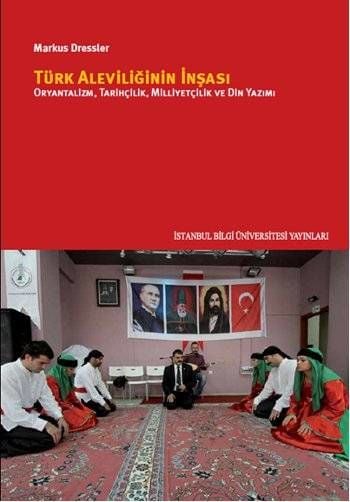
Türk Aleviliğinin İnşası - Oryantalizm, Tarihçilik, Milliyetçilik ve Din Yazımı
In this book, Associate Professor Markus Dressler, who is currently a lecturer at the Department of Religious Sciences at Bayreuth University in Germany and who studies on the history of religion, religious policies in Turkey and especially Alevism, aims to "historicize" the dominant and ongoing knowledge patterns on Alevis and Alevism. According to the author, it is not a very old phenomenon that Alevism and Alevis are seen as "heterodox" but Muslims, within Turkish culture and as an element of this culture. The knowledge that is the source of this phenomenon was created with the emergence of new discourses regarding religious and ethnic differences, which were framed in the last years of the Ottoman Empire and the first years of the Republic of Turkey, and most importantly, with the laying of the foundations of the Turkish nation-state. While the term "Alevi" appears in ancient Islamic texts, " The term "Alevism" was introduced only in II. It can be found in Ottoman documents during the reign of Abdulhamid, which were far from containing the concepts associated with today's modern Alevism. In particular, Kızılbaşlık, which is still used today as a derogatory and perverted definition, and the reference to Alevi communities as "Alevi Cemiyet-i Fesadiyesi" in some documents also characterize the understanding of this early period. However, later, while the knowledge needed by Turkish nationalism in the construction of the nation-state was being created; Alevism has deviated from Sunnism, but has been defined as a formation that essentially incorporates heterodox Turkish Islam and Turkish cultural elements. This book by Dressler deals with Alevi identity and the early periods of Alevis becoming a material for Turkish nationalist politics. Especially Fuad Köprülü's theses conceptualizing intra-Islamic differences, the connections between historiography, sociology and nation-building; In this sense, the "symbiotic relationship" between Köprülü and Ziya Gökalp and the broad framework extending from the Turkish History Thesis to religion writing give the work a different content.
The Construction of Turkish Alevism, the first "critical genealogy" in the field of Alevi studies, presents an extraordinary investigation of the effects of Western concepts frequently used in the field of religious studies in terms of the representation, academic study, and state management of religious communities outside the West. While Dressler sets a new standard for "Alevism" studies in Turkey, he also makes a great contribution to the methodology of religious studies.
- Prof. Dr. Ahmet T. Karamustafa, University of Maryland-
(From the Promotional Bulletin)
Number of Pages: 342
Year of Printing: 2016
Language: Turkish
Publisher: Istanbul Bilgi University Publications
Editor: Cem Tüzün
First Print Year: 2016
Number of Pages: 342
Language Turkish
| Publisher | : | Istanbul Bilgi University Publications |
| Number of pages | : | 342 |
| Publication Year | : | 2016 |
| ISBN | : | 9786053994329 |
| The heart | : | Turkish |


